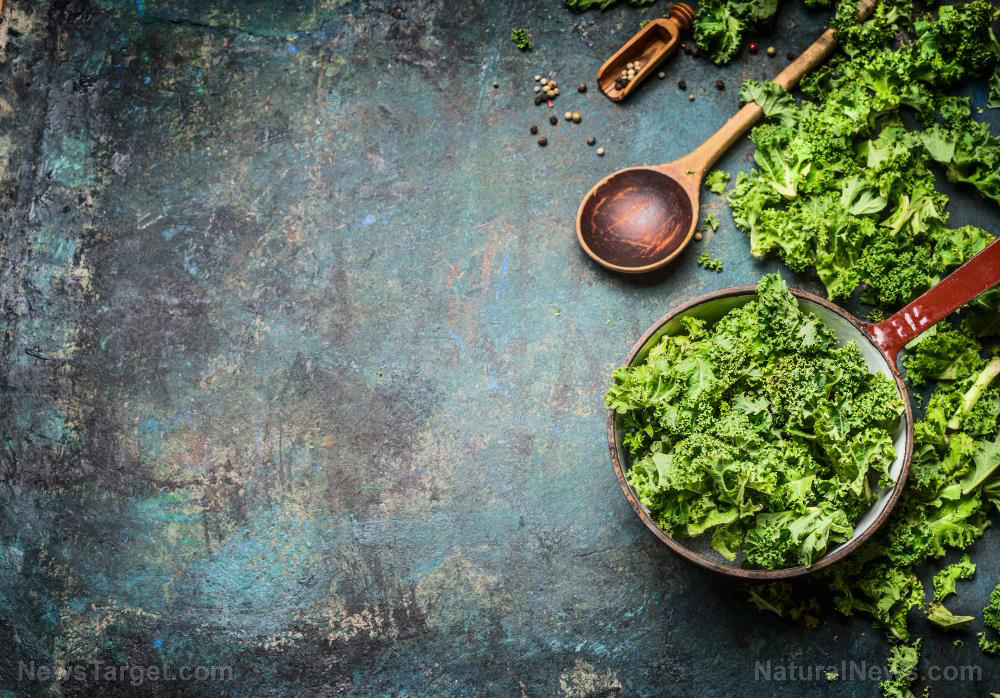Kale is a nutrient-dense superfood because of these 7 health benefits

(Natural News) Kale is a nutrient-dense superfood belonging to the same family of vegetables known as cruciferous vegetables. This family includes other well-known superfoods like broccoli, cabbage, cauliflower, Brussels sprouts and collard greens. Kale lives up to the reputation of its cousins thanks to its impressive health-enhancing properties.
Kale is nutrient-dense
Kale is one of the most nutrient-dense foods on the planet. This means that its per serving nutritional content is very powerful. Just one cup (136 g) of kale can provide more than 100 percent of your daily requirement of vitamin C and over 200 percent when it comes to vitamin A. It contains other health-supporting nutrients, such as plant protein, iron, potassium, calcium, magnesium, copper, manganese and phosphorus. It even contains some plant-based omega-3 fatty acids. (Related: Here’s why kale is called the ‘beef’ of a plant-based diet.)
Kale supports heart health
The potassium, fiber, vitamin B6 and vitamin C in kale support heart function. Furthermore, a study published in the journal Food Chemistry has suggested that eating kale can reduce your cholesterol by increasing its excretion and preventing it from being reabsorbed into the bloodstream.
Kale promotes bone health
Kale is an excellent source of vitamin K, which is a necessary nutrient for the formation of bones. A review published in the journal Archives of Internal Medicine found that vitamin K can reduce bone loss. Just one cup of kale can give you nearly 700 percent of your daily requirement of vitamin K.
Sponsored: NEW Biostructured Silver First Aid Gel created by the Health Ranger combines three types of silver (ionic silver, colloidal silver, biostructured silver) with seven potent botanicals (rosemary, oregano, cinnamon and more) to create a breakthrough first aid silver gel. Over 50 ppm silver, verified via ICP-MS lab analysis. Made from 100% Texas rain water and 70% solar power. Zero chemical preservatives, fragrances or emulsifiers. See full details here.
Kale helps keep inflammation at bay
Kale is a potent source of antioxidants, which makes it an excellent disease-fighting superfood. These antioxidants reduce inflammation, which can cause diseases and signs of premature aging to appear. Antioxidants can also protect you against oxidative stress, which occurs when cell-damaging free radicals build up and your body isn’t able to counter their harmful effects.
Kale supports eye health
Kale is a great source of the antioxidant carotenoids zeaxanthin and lutein. These two compounds are famous for their ability to protect your eyes, particularly the retina and lens. These two carotenoids are also responsible for reducing the risk of some common eye disorders, such as cataracts and macular degeneration.
Kale may help reduce your cancer risk
Kale, much like many other cruciferous vegetables, contains natural compounds that may help your body prevent cancer. It has high levels of the compound sulforaphane, a substance many researchers believe can fight the formation of cancer at the molecular level. Further evidence also suggests that kale’s other properties can fend off cancer in many ways, such as by inducing cell death and helping to deactivate any carcinogens in your system.
Kale is low in calories
Just one cup of kale gives you anywhere between 10 to 30 calories. Yet, the water and fiber in kale will make you feel full faster. This means you can consume more kale, take in all of its nutrients and health-supporting properties, and keep your figure by cutting back on more caloric foods. For example, switching out one cup of cooked brown rice for half a cup of rice and one cup of chopped kale will save you about 85 calories.
If you’re unsure how to add kale to your diet, don’t worry – kale can be eaten with almost anything. You can serve it over eggs for a nutritious breakfast salad or you can blend it into your green smoothies. Whenever you choose to eat kale, you can be certain that you’re going to be healthier because of it.
Sources include:



